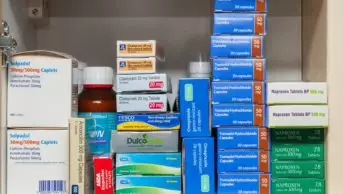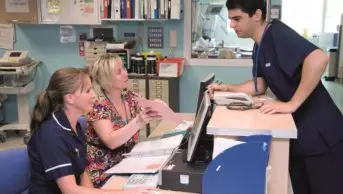
Shutterstock.com
After reading this article you should be able to:
- Define the term ‘medicines reconciliation’;
- Discuss why timely medicines reconciliation is a vital aspect of patient care;
- Appraise the strengths and weaknesses of different sources used to obtain a patient’s medication history;
- Prioritise patients requiring medicines reconciliation when they are admitted to hospital.
Introduction
The ageing population and associated rise in polypharmacy makes medicines reconciliation more challenging. Pharmacists play an important role in ensuring this task is completed safely and in a person-centred way when patients move between care settings. This article will discuss the importance of medicines reconciliation and offer guidance on how to take an accurate medication history.
Medicines reconciliation is the process of compiling a complete list of a person’s current medicines[1,2]. The Institute for Healthcare Improvement recommends that the process includes:
- Compiling a list of the patient’s current prescribed medicines;
- Comparing this with what they’re actually taking;
- Identifying and resolving any discrepancies;
- Documenting the reasons for any changes made[2].
Why is medicines reconciliation important?
If prescribers do not have a full, accurate list of a patient’s current medicines, including over-the-counter remedies and herbal supplements, they could make inappropriate prescribing decisions[3]. Adverse drug reactions (ADRs) contribute to approximately 16.5% of all hospital admissions[4]. Some ADRs can have a delayed onset[5] (e.g. flucloxacillin-induced cholestatic jaundice may be delayed for up to two months after the course has been completed[6]) and drugs with a long half-life (e.g. amiodarone[7]) can continue to cause adverse effects and interact with other medicines for weeks (or even months) after being discontinued. Overlooking ADRs as a potential cause of a patient’s symptoms can also contribute to the ‘prescribing cascade’ and inappropriate polypharmacy[8,9].
Previous studies have identified that 30–70% of patients have unintentional changes to their medicines when they transfer between care settings[10]. Omission of medication was the most common error type identified by the ‘EQUIP’ study, accounting for 29.8% of errors detected[11]. Timely and accurate medicines reconciliation can help to reduce omitted and delayed doses of critical medicines, such as anticonvulsants, anticoagulants and treatments for Parkinson’s disease (PD)[12]. A report published by Parkinson’s UK in 2019 identified that 63% of patients with PD did not always get their medicines on time during a hospital admission[13].
Pharmacists working in pre-operative clinics can also help avoid cancellation of surgeries by taking an accurate medication history and providing appropriate advice[14]. Surgeries sometimes have to be cancelled if specific medicines are not withheld beforehand. Anticoagulants and antiplatelets need to be withheld for specific time periods prior to surgery or endoscopic procedures, depending on the procedure’s risk of bleeding[15]. Angiotensin-converting enzyme inhibitors must be withheld on the day of surgery because of the risk of intra-operative hypotension. A patient’s risk of venous thromboembolism (VTE) can be increased by medicines such as the oral contraceptive pill and hormone replacement therapy; for emergency procedures, knowing the patient takes either of these can help ensure they are given the appropriate VTE prophylaxis.
How to obtain an accurate medication history
The first step in medicines reconciliation is to obtain an accurate list of medicines that the patient usually takes. Although the responsibility for obtaining a medication history has traditionally been assumed by doctors, studies have shown that pharmacists acquire more accurate and complete medication histories[16–18]. Obtaining medication histories has also become an important role for pharmacy technicians working on hospital wards[19]. Since all sources used to obtain a medication history have strengths and weaknesses, hospital guidelines often recommend the use of at least two sources. However, a patient with no known long-term conditions who states that they do not take any regular medicines may be trusted as a single source, while three or more sources may be needed for patients being managed by multiple specialist teams.
Patients should always be asked about their medicines, unless it is not physically possible (e.g. if they are unconscious or confused). In those cases, a parent, partner or carer might be consulted instead. A suggested consultation schedule is provided in Box 1.
Box 1: A suggested approach to a consultation with patients and/or their carers about the medicines they take
- Introduce yourself clearly to the patient (in line with the ‘Hello my name is’ campaign and explain the purpose of the consultation[20];
- Avoid jargon and leading questions;
- Start by asking “Do you take any regular medication prescribed by your doctor?”
- Some patients may not consider items that are not taken orally to be medicines, so depending on their comorbidities it is worth asking specifically about use of inhalers, eye drops, creams/ointments, patches and injections;
- Some may not consider the oral contraceptive pill or hormone replacement therapy as medicines either, so they may need additional questioning (depending on their age and medical history);
- Ask if they take anything prescribed for anyone else (e.g. a relative);
- Ask about recent medication changes (either by the doctor or patient themselves) and reasons why;
- Ask about recent short courses of medicines (e.g. antibiotics, steroids);
- Ask about recreational drug use. To avoid offending the patient, inform them that this is something you have to ask all patients;
- Enquire about allergies and previous intolerances; if a patient lists any medicines, ask them for details of the reaction(s) experienced;
- Ask about smoking and alcohol use;
- Enquire about medicines purchased over the counter (including herbal and homeopathic medicines), online and from health food shops. The withdrawal of pholcodine-containing products in March 2023 owing to increased risk of anaphylactic reactions following administration of neuromuscular blocking agents highlights the importance of this[21];
- Assess adherence to medicines. To avoid seeming judgmental, you could consider saying: “All patients miss some doses of their medicines, how many doses do you think you have missed in the past week?”
Patients may struggle to remember the names and doses of medicines they take, especially if they are receiving polypharmacy. Acute illnesses may also affect their ability to recall this information accurately. Patients with drug-seeking behaviour may lie about what they are prescribed to obtain additional supplies. Patients whose first language is not English may require an interpreter when they’re interviewed; however, the quality and accessibility of these services varies[22].
Sources of medicine histories
Patients’ own medicines
Patients’ own medicines brought into hospital should be used to help confirm their medication history and may help prompt patients to provide information about what they take. However, there are limitations to using this as a source for medication histories:
- Some medicines may have been left at home if the patient stores some separately (e.g. eye drops in the refrigerator, patients with some medicines dispensed in a multi-compartmental compliance aid [MCCA]) and others in original boxes);
- The dispensing label may not state the dose (e.g. insulins) or the dose taken by the patient may differ as a result of their own action (e.g. reducing a dose because of side effects), advice from the prescriber (e.g. a phosphate binder dose adjusted according to their serum phosphate), or a dispensing error;
- The medicines brought in may not belong to the patient – they may have brought in their spouse’s or relative’s medicines by mistake or have ‘borrowed’ them from someone;
- Medicines belonging to patients who live outside the UK can have different names in other countries; Martindale: The Complete Drug Reference is a useful resource for confirming the UK names[23];
- The patient may not be taking the medicine at all; the date of dispensing can indicate an adherence issue.
GP surgeries
GP surgeries can provide prescribed medicine lists; however, these list only what the GP intends the patient to take, and the patient may deviate from these instructions, or the list may not have been updated following a recent hospital admission or outpatient clinic appointment. Access to summary care records (SCRs) by pharmacy professionals working in hospitals has eliminated some of the barriers highlighted in a previous article on medication histories, but patients have the right to opt out of their information being shared and the SCR is not used in Wales[24]. Patients visiting from foreign countries will not have a UK-based SCR and it is often not feasible to contact their usual care provider to confirm their list of medicines.
Previous prescriptions
Previous discharge prescriptions, either filed in the case notes or accessed electronically, may help if a patient has been discharged from hospital within the past month. However, the patient should be asked whether there have been any changes to their medicines since then.
Medicine administration records
Medicine administration record (MAR) sheets may accompany a patient admitted from a nursing or residential home. These should be read carefully to identify any medicines recently started, discontinued, omitted or refused by the patient. Extra care should be taken with MAR sheets that have handwritten additions or amendments and those that do not indicate how many pages of the MAR there are. Sometimes a different patient’s MAR sheet may have been sent with the patient.
Patient medication lists
Patient medication lists (either repeat prescriptions or self-produced lists) may accompany the patient on admission to hospital. Ask the patient whether all parts of the repeat prescription list have been brought in, whether they still take all these medicines and if there is anything else they use.
Community pharmacies
In some regions, over 80% of patients use the same community pharmacy for their regular medicines[25]. However, since a patient may visit any community pharmacy, the pharmacy may not hold an accurate list of all medicines and should not be used as a single source of information. Community pharmacies can provide useful information about MCCAs and when other sources are unavailable (e.g. methadone doses and date of the most recent pick-up when the community drug service is closed).
Specialist clinics
Specialist clinics may also hold additional information about medicines they prescribe instead of the GP. The patient’s medical history may suggest that they receive medicines via another prescriber (e.g. donepezil from a memory clinic, antiretrovirals from an HIV clinic, or methadone from a community drug service). These medicines may not be listed on the patient’s summary care record or those listed may have ‘not issued’ next to them, which could lead to them being omitted from medication histories. A problematic example is clozapine, which will need retitrating if it is omitted for more than 48 hours[26].
Community and district nurses
Community and district nurses may be able to confirm medication details, such as the dose and frequency of antipsychotic depot injections or insulin doses.
Documenting medication histories in secondary care
In secondary care, a medication history is usually documented in the patient’s case notes as part of the admissions clerking, with pharmacists making separate entries if they identify any errors. Some trusts use a dedicated proforma (either paper-based or in an electronic system) to document a medication history and completion of medicines reconciliation (see Figure 1). Forms such as these have the potential benefit of being a single point of reference for changes made to a patient’s pre-admission medicines and thus improve the quality of information provided to GPs upon discharge.
When should medicines reconciliation be performed?
Medicines reconciliation should be performed any time a patient moves between care settings (e.g. upon admission to hospital, following an outpatient clinic appointment) and when they are transferred between different clinical areas of a hospital (e.g. medical ward to critical care). The method of medicines reconciliation may differ depending on which settings the patient transfers between.
The National Institute for Health and Care Excellence (NICE) quality standard for medicines optimisation requires patients in an acute setting to have their medicines reconciled within 24 hours of admission, as medicines-related incidents are more likely if it is completed after that time[27].
Some hospitals operate a hybrid system for prescribing, in which some wards use an electronic system and others (typically accident and emergency departments and critical care units) use paper charts. Errors can occur when patients are transferred between wards and their medicines are transcribed from one format to another, so medicines reconciliation may need to be repeated. Patients admitted to critical care may have some medicines temporarily stopped (e.g. antihypertensives in cases of shock) that need re-starting once they are transferred back to a general ward. Some medicines started on critical care (e.g. melatonin to restore circadian rhythm after weaning from a ventilator, proton pump inhibitors for stress ulcer prophylaxis) may get continued inappropriately following ward step-down.
When a patient is to be discharged from hospital, their discharge prescription should include all the medicines that they are to take at this point, whether these are to continue long-term, and course lengths where appropriate (e.g. for antibiotics and oral steroids)[10]. Some medicines may have been intended for hospital use only (e.g. benzodiazepines or z-drugs for insomnia) and should not be copied onto the discharge prescription. The list of medicines should also be compared with the medication history documented on admission, so that the patient’s GP can be informed why medicines taken prior to admission have been stopped or had changes made to the dosage or formulations.
Patients who have been discharged from a care setting should have their medicines reconciled within a week of the GP practice receiving the information and before any further or repeat prescriptions are issued[27].
Prioritising hospital patients for review
Completing medicines reconciliation can be particularly daunting in an admissions setting, where the majority of, if not all, patients need their medication history and medicines reconciliation completed every day. Identifying which patients need to be prioritised for review can be difficult. The following questions can aid the decision-making process:
- Which patients are more acutely unwell? For example, do any patients have an acute kidney injury? The patient’s regular medicines can affect kidney function, so it is important to review these in a timely manner[28];
- Which patients are taking a critical medicine? The critical medications most commonly prescribed include Parkinson’s medications, anti-epileptics, insulin and anticoagulants, all of which are time critical, so it is important that they are prescribed correctly;
- Do any patients have no medicines prescribed at all? Having no inpatient prescription is unusual and usually suggests that the doctors do not know any of the medicines that the patient was taking at home, therefore it is important to prioritise these patients.
Box 2 contains an example of prioritising which regular medicines need review before others.
Box 2: Prioritising medicines for review
You review a patient admitted with community-acquired pneumonia at 09.00. They normally have the following medicines:
- Spiriva Respimat inhaler, two puffs every morning;
- Novomix30 Flexpen 100units/mL, 16 units twice daily;
- Quinine sulphate tablets, 300mg at night;
- Hyoscine butylbromide, 20mg when required.
You notice that none of these are currently prescribed for the patient. Which of these medicines would you ask the prescribers looking after the patient to prioritise first?
The correct answer is Novomix30. The rest are not critical medicines and can wait until later in the day for review.
After deciding which patients to review first, pharmacy professionals need to identify any important medicines reconciliation discrepancies and highlight these to prescribers promptly, to avoid potential patient safety issues. Those that require less urgent action can wait (e.g. until after a ward round has finished) to help prescribers to manage their busy workload and improve patient outcomes. Although it is important to understand that ward rounds should not normally be interrupted (as it takes attention away from tasks at hand), an exception would be cases where harm could come to patients owing to missed or incorrect medicines.
Less experienced clinical pharmacists often don’t have the confidence to interrupt doctors during the ward round. The cases below illustrate when prescribers should be approached during ongoing ward rounds for urgent medicines-safety-related issues.
Case 1
A patient with epilepsy normally takes carbamazepine tablets 400mg twice daily and is admitted to hospital overnight. You review the patient the following morning and, after obtaining their medication, you realise that their carbamazepine has not been prescribed. You investigate whether this is intentional or not and cannot see a reason documented why it would have been withheld. The medication appears to be appropriate to continue given the patient’s current clinical condition. It is now 10.30 and the doctors have not yet reviewed the patient on the ward round. What should the pharmacist do?
The pharmacist should escalate this to the doctors on the ward round to ensure the carbamazepine is prescribed, supplied and administered promptly. If this is left until after the ward round, the patient will probably miss their morning dose, which could have detrimental effects.
Case 2
An 86-year-old patient is admitted to the ward following a fall at home. You complete their medicines reconciliation and notice that their usual Adcal-D3 and folic acid prescriptions are missing from the inpatient prescription. The doctors have already reviewed the patient on the ward round and moved onto another patient. What should the pharmacist do?
In this case, there is no need to interrupt the ward round; neither of these medicines are critical medicines so can wait until later in the day for review and prescribing.
Case 3
Prioritising medication-related issues is important when pre-empting problems and following up other issues. The provision of clinical pharmacy services during weekends varies between trusts, therefore any issues identified on Friday ideally need resolving by the end of the day to prevent problems over the weekend. The following case was a real scenario and is included in a trust’s training to highlight the importance of thinking ahead:
It’s 16.00 on a Friday afternoon and a patient who normally takes methadone oral solution (previous IVDU) is admitted to your ward. Their medication history was completed in the emergency department by a pharmacy technician, but the pharmacist did not have chance to review them before they were moved to the ward. After reviewing the patient’s documentation, you can see that they are breathless and being treated for pneumonia with IV co-amoxiclav. The patient had their dose of methadone this morning before admission to hospital, however you notice that methadone is not prescribed on their in-patient prescription. What should the pharmacist do?
Highlight this issue to prescribers as soon as possible, as the patient might otherwise not be reviewed over the weekend and therefore might miss doses of methadone. If it is not possible to resolve today, ideally hand over to the pharmacy late or weekend team (if available) for review later in the day or first thing in the morning.
Summary
Medicines reconciliation is a vital aspect of patient care that, if not completed accurately and promptly, can affect patient safety. Pharmacists and pharmacy technicians can support and even lead on medicines reconciliation to reduce errors when patients move between care settings and help reduce omitted and delayed doses of critical medicines for patients admitted to hospital. Prioritising medicines reconciliation discrepancies can also help manage the workload of prescribing colleagues, improving professional relationships within the multidisciplinary team.
This article was reviewed in July 2023, to ensure it remains relevant and up to date, following its original publication in The Pharmaceutical Journal in 2016.
- 1Medicines Reconciliation. Care Quality Commission. 2023.https://www.cqc.org.uk/guidance-providers/adult-social-care/medicines-reconciliation-how-check-you-have-right-medicines (accessed Jul 2023).
- 2Medication Reconciliation Review. Institute for Healthcare Improvement. 2015.https://www.ihi.org/resources/Pages/Tools/MedicationReconciliationReview.aspx (accessed Jul 2023).
- 3Good Practice in Prescribing and Managing Medicines and Devices. General Medical Council . 2021.https://www.gmc-uk.org/ethical-guidance/ethical-guidance-for-doctors/good-practice-in-prescribing-and-managing-medicines-and-devices (accessed Jul 2023).
- 4Osanlou R, Walker L, Hughes DA, et al. Adverse drug reactions, multimorbidity and polypharmacy: a prospective analysis of 1 month of medical admissions. BMJ Open. 2022;12:e055551. doi:10.1136/bmjopen-2021-055551
- 5Side effects (adverse drug reactions). Medicines and Healthcare Products Regulatory Agency. https://yellowcard.mhra.gov.uk/sideeffects (accessed Jul 2023).
- 6Flucloxacillin 500mg capsules, hard. Electronic Medicines Compendium. 2021.https://www.medicines.org.uk/emc/product/12636/smpc (accessed Jul 2023).
- 7Amiodarone Hydrochloride 200mg Tablets. Electronic Medicines Compendium. https://www.medicines.org.uk/emc/product/13964/smpc (accessed Jul 2023).
- 8Duerden M, Avery T, Payne R. Polypharmacy and medicines optimisation: making it safe and sound. The King’s Fund. 2013.https://www.kingsfund.org.uk/sites/default/files/field/field_publication_file/polypharmacy-and-medicines-optimisation-kingsfund-nov13.pdf (accessed Jul 2023).
- 9Rochon PA, Gurwitz JH. The prescribing cascade revisited. The Lancet. 2017;389:1778–80. doi:10.1016/s0140-6736(17)31188-1
- 10Keeping patients safe when they transfer between care providers – getting the medicines right. Royal Pharmaceutical Society. 2012.https://www.rpharms.com/Portals/0/RPS%20document%20library/Open%20access/Publications/Keeping%20patients%20safe%20transfer%20of%20care%20report.pdf (accessed Jul 2023).
- 11Dornan T, Ashcroft D, Heathfield H, et al. An in depth investigation into causes of prescribing errors by foundation trainees in relation to their medical education. EQUIP study. General Medical Council. 2009.https://www.gmc-uk.org/-/media/documents/FINAL_Report_prevalence_and_causes_of_prescribing_errors.pdf_28935150.pdf (accessed Jul 2023).
- 12Reducing harm from omitted and delayed medicines in hospital. National Patient Safety Agency. 2010.https://webarchive.nationalarchives.gov.uk/ukgwa/20171030124648/http://www.nrls.npsa.nhs.uk/resources/type/alerts/?entryid45=66720 (accessed Jul 2023).
- 13Get it on time – the case for improving medication management for Parkinson’s. Parkinson’s UK. 2019.https://www.parkinsons.org.uk/get-involved/get-it-time?psafe_param=1&gclid=Cj0KCQjw4s-kBhDqARIsAN-ipH29oebcF7i838iCspVF47d28zaoqFsVJZPfE0pjndHUEg02sTk5b24aAr3XEALw_wcB&gclsrc=aw.ds (accessed Jul 2023).
- 14Herring C. How can surgical pharmacists help cut NHS waiting lists? Rx Clinical Pharmacy Magazine. 2016.https://rxmagazine.org/how-can-surgical-pharmacists-help-cut-nhs-waiting-lists (accessed Jul 2023).
- 15The Handbook of Perioperative Medicines. UK Clinical Pharmacy Association. 2016.https://www.ukcpa-periophandbook.co.uk/ (accessed Jul 2023).
- 16Lau HS, Florax C, Porsius AJ, et al. The completeness of medication histories in hospital medical records of patients admitted to general internal medicine wards. British Journal of Clinical Pharmacology. 2000;49:597–603. doi:10.1046/j.1365-2125.2000.00204.x
- 17Tam VC. Frequency, type and clinical importance of medication history errors at admission to hospital: a systematic review. Canadian Medical Association Journal. 2005;173:510–5. doi:10.1503/cmaj.045311
- 18Hatch J, Becker T, Fish JT. Difference between Pharmacist-Obtained and Physician-Obtained Medication Histories in the Intensive Care Unit. Hosp Pharm. 2011;46:262–8. doi:10.1310/hpj4604-262
- 19Roles in Pharmacy: Pharmacy Technician. We Care Together. 2023.https://wecaretogethernw.co.uk/roles-in-pharmacy-pharmacy-technician/ (accessed Jul 2023).
- 20Granger K. A Message from Kate about the Campaign. Hello my name is . 2023.https://www.hellomynameis.org.uk/ (accessed Jul 2023).
- 21Pholcodine-containing cough and cold medicines: withdrawal from UK market as a precautionary measure. Medicines and Healthcare products Regulatory Agency. 2023.https://www.gov.uk/drug-safety-update/pholcodine-containing-cough-and-cold-medicines-withdrawal-from-uk-market-as-a-precautionary-measure#:~:text=provide%20to%20patients%3A-,pholcodine%2Dcontaining%20cough%20and%20cold%20medicines%20are%20being%20withdraw (accessed Jul 2023).
- 22Patel J. The Impact of Language Barriers on Patient Care: A Pharmacy Perspective. PM Healthcare Journal. 2023.https://www.pmhealthcare.co.uk/uploads/Journals/PM%20Healthcare%20Journal%20-%20Spring%202023_V4.pdf (accessed Jul 2023).
- 23. Martindale: The Complete Drug Reference. https://www.pharmaceuticalpress.com/products/martindale-the-complete-drug-reference/ (accessed Jul 2023).
- 24How to take an accurate and detailed medication history. Pharmaceutical Journal. 2016. doi:10.1211/pj.2016.20200476
- 25Bellingham C. How to improve medicines management at the primary/secondary care interface. Pharm J 2016;296:210–1. doi:10.1211/PJ.2016.20200476
- 26Clozaril 100mg Tablets. Electronic Medicines Compendium. 2020.https://www.medicines.org.uk/emc/product/10290/smpc (accessed Jul 2023).
- 27Medicines Optimisation Quality Standard (QS120). National Institute for Health and Care Excellence. 2016.https://www.nice.org.uk/guidance/qs120 (accessed Jul 2023).
- 28Kanagasundaram S, Ashley C, Bhojani S, et al. Clinical Practice Guideline Acute Kidney Injury (AKI). UK Kidney Association. 2019.https://ukkidney.org/sites/renal.org/files/FINAL-AKI-Guideline.pdf (accessed Jul 2023).
You might also be interested in…

Medicines reconciliation to be an essential service from 2020/2021, says NHS England

Poor communication about medicines when patients transfer from secondary to primary care, audit reveals
